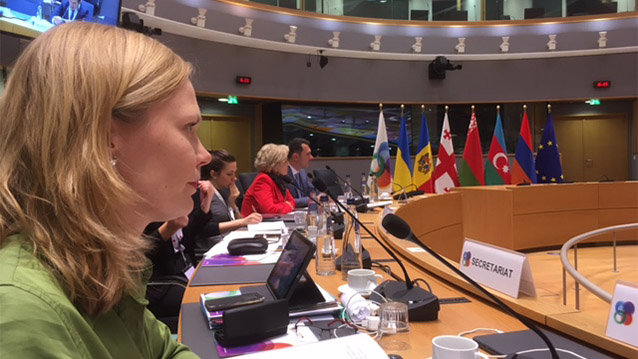Chair Conclusions
First Eastern Partnership Ministerial Meeting on Education

Under the Finnish Presidency of the EU Council and in the context of the 10th anniversary of the Eastern Partnership, the Ministers of the three successive presidencies of the Council of the European Union, the Ministers for Education of the Eastern Partnership countries, and the representatives of the European Union met on 22 November 2019 in Brussels.
This first Ministerial meeting on Education took stock of the successful cooperation in the field, discussed key trends in teaching and learning and reflected on future engagement.
Finland strongly believes that it is vital for EU Member States and Eastern Partnership countries to invest in education and skills. That helps us manage change and build sustainable, resilient and fair societies. It is important for the whole Europe and the future of our continent, says minister of Science and Culture Hanna Kosonen.
The Presidency notes the following:
- Ministers welcomed the first Eastern Partnership Ministerial Meeting on Education, bringing together the Ministers and high-level representatives of the three successive presidencies of the Council of the EU, the Eastern Partnership (EaP) countries and the European Union.
- Ministers stressed the importance of this meeting as a valuable opportunity to reaffirm the shared commitment to education reforms and cooperation.
- Ministers reiterated that it is a strategic goal of EU Member States and Eastern Partnership countries to invest in education, knowledge and skills.
- Ministers welcomed the theme of the meeting “Future of Learning and Teaching”, which emphasises the rapid changes affecting education and requiring adequate response and a stronger focus on competence development for the decades to come, high quality teachers and innovative teaching and learning practices.
- Ministers recognised that globalisation, technological progress, sustainability challenges, social inclusion challenges, political instability and demographic change are having a profound impact on our societies and citizens.
- Ministers acknowledged the key role education plays in managing change and building sustainable, resilient and fair societies. The two main roles of education and training ‒ their contribution to competitiveness, innovation and employability and their contribution to active citizenship, social inclusion, cohesion and personal development ‒ are closely intertwined and fully complementary in today’s societies.
- Ministers recognised the key role of Erasmus+ in fostering education reforms, enhancing internationalisation, promoting employability and competence development, driving innovation and supporting relevant and high quality learning and teaching practices.
- Ministers underlined the importance of policies and actions that will:
a) enhance inclusiveness and reduce the share of young people not in employment, education or training;
b) empower young people to become agents for transformational change and further promote creativity, new thinking, active citizenship and social responsibility;
c) promote innovation-driven teaching and learning which involves strengthening cooperation between education institutions, and deeper engagement beyond academia, including with regional and national authorities, businesses, employers, research institutions and civil society;
d) take advantage of the digital transformation for teaching and learning, to develop digital competences and skills, including critical thinking and media literacy, and improve education through data analysis and foresight;
e) train and upskill teachers and empower them to initiate innovative pedagogies and support change in education processes;
f) support quality assurance, facilitate mutual recognition of qualifications and facilitate international mobility of teachers and learners as well as cooperation across borders;
g) continue governance and institutional reforms.
- Ministers emphasised the critical role of teachers in achieving high-quality education for all learners and therefore, stressed the need to make teaching career more valued and attractive and to continuously develop the competences of teachers. The utilisation of the latest research on learning and teaching is important, both in pre- and in-service teacher education.
- Ministers welcomed the preparation of the new generation of EU programmes and initiatives, stressed the focus on digitalisation, inclusiveness and innovative teaching and learning, and committed themselves to engage actively in the effective implementation.
- Ministers agreed to retain education high on the political agenda in the future cooperation, and to accelerate the development and implementation of their actions and policies in line with the goals set in the 2017 Eastern Partnership Summit Declaration as well as the targets agreed in the "20 Deliverables for 2020" document and its successor.
- Ministers confirmed their continued commitment to reforms in the education sector as well as institutional reforms in general.
- Ministers invited the EU Commission and High Representative to present a set of long-term policy objectives on the basis of the consultations on the future of the Eastern Partnership launched by EU Commission President Juncker in May 2019 and with a view to the next Eastern Partnership Summit.
- Ministers agreed to continue working together with a view to achieve concrete results in areas that will benefit the citizens of the Eastern Partner Countries and the EU.
Finally, - Ministers agreed to meet again in due course to assess progress on cooperation between the EU and the Eastern Partnership partners.
Inquiries:
Senior Ministerial Adviser Johanna Hulkko, tel. +358 295330318

